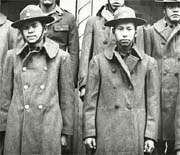|
|
Last Meskwaki code talker remembers

Frank Sanache, right, was one of 27 Meskwaki to enlist in the Army together in January 1941, nearly a year before Pearl Harbor. Eight became code talkers.
TAMA, Iowa (AP) Soft-spoken Frank Sanache relaxes on the back porch of his home at the end of Battleground Drive, remembering how he and seven other young Meskwaki men used their language against the Germans in North Africa. Sanache was a code talker, venturing out far beyond the battalion and using a walkie-talkie to direct artillery fire in the desert. "It was the worst place this side of hell," said Sanache, 84. Sanache was one of 27 Meskwaki, then 16% of Iowa's Meskwaki population, to enlist in the Army together in January 1941, nearly a year before Pearl Harbor. Eight of the group Sanache, his brother Willard, Dewey Youngbear, Edward Benson, Judy Wayne Wabaunasee, Mike Wayne Wabaunasee, Dewey Roberts and Mike Twin became code talkers. During World War II, the U.S. military used a code developed from American Indian languages to communicate sensitive information. The code was never broken. The Meskwaki were among 18 tribes who supplied code talkers during the war, but the Navajo, who sent up to 420 men, are perhaps the best known. The recently released movie Windtalkers focuses on the Navajo and President Bush honored the Navajo code talkers in a ceremony last summer. The Meskwaki men trained in Marshalltown and served together in the 168th Infantry, 34th Division. After jungle warfare training in Louisiana and code talker training in Scotland and England, they were sent to North Africa. Alex Walker, tribal council chairman, said he remembers growing up and hearing the tales of the code talkers. "Frank used to tell me about how he would be sent out as a scout," Walker said. "They used to send him about two miles ahead of the troops in dangerous conditions. There were only eight of them so they worked 24-hour shifts." The walkie-talkies squealed and chattered so loudly, it was difficult to hear one another, said Don Wanatee, Sanache's adopted grandson. There simply weren't enough of them to effectively transmit messages between the eight companies in the division, he said. Sanache was captured by the Germans at Feid Pass in Tunisia. He said the Army had orders to kill the code talkers if they were captured to keep the code a secret. The U.S. Marine Corps has publicly denied that accusation. Either way, Sanache survived. He was sent to a camp in Hammerstein, Poland, where he was held until the Allies liberated the camp at the end of the war. For 29 months, he said, his days were spent unloading lime from rail cars, leaving him with scarred lungs and a variety of chronic illnesses. His daily rations included a cup of soup, two boiled potatoes, a glass of water and a slice of bread, he said. "The first time my wife, Bernice, made me boiled potatoes after the war, I threw them out the door," Sanache said with a laugh. "I told her I'd never eat those again." Walker, who grew up hearing tribal tales of the code talkers, said the eight veterans were revered when they returned from the war. "They would tell their stories at the tribal ceremonies," Walker said. "They were treated like the old time warriors." Sanache worked at a paper mill in Tama for 38 years and is now retired, the last living code talker among the Meskwaki. He has become involved with a group of former prisoners of war. Since President Bush honored the Navajo code talkers last summer, Sen. Tom Harkin, D-Iowa, has introduced legislation that would honor all other code talkers with the Congressional Gold Medal. "I don't want the medal unless everyone who went is awarded," Sanache said, who has three bronze stars. Harkin learned of the Meskwaki code talkers from an article in American Indian , the Smithsonian Institution's National Museum of the American Indian magazine, spokeswoman Tricia Enright said. "When he saw it, he asked us to find out who they are and whether they had been commemorated," Enright said. "They hadn't been, so that's when he drafted the legislation to honor them." Walker said the Meskwaki are pleased Harkin wants to honor their code talkers. "The government has never done anything for them," Walker said. "We look forward to having them honored for their participation in the war."
|
|
|
|
|
 Native American Nations
Native American Nations
